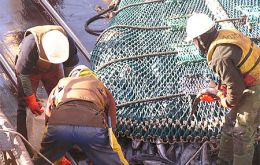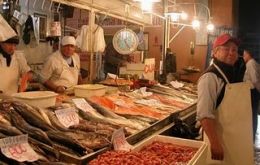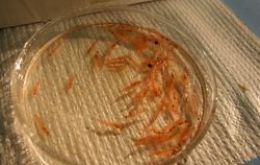MercoPress. South Atlantic News Agency
Stories for 2010
-
Monday, December 27th 2010 - 08:28 UTC
Iguazu Falls will complete a record year of visitors

Over a million tourists (1.064.731) had visited until Christmas Argentina’s Iguazu Falls national park, a number which should reach 1.2 million when the 2010 calendar year is completed according to Iguazu Argentina that have the park’s concession.
-
Monday, December 27th 2010 - 08:20 UTC
Chilean Senate drafts bill to combat illegal fishing in Antarctic convergence area

The Chilean Senate Committee on Fisheries approved the project that modifies the Fisheries Law and severe establishes penalties for illegal catches in the Antarctic convergence area. The next step is a vote on the floor that seems secured given the committee’s outcome.
-
Monday, December 27th 2010 - 08:15 UTC
Seafood delicacy with over 10.000 years of history, Chilean abalone

A 19-year investigation by two Chilean researchers confirms that Chilean abalone, known locally as “locos,” have been a staple in the diet for people living near the coasts in this part of the world for at least the past 10,400 years.
-
Monday, December 27th 2010 - 08:02 UTC
China raises interest rate determined to contain inflation, credit and property prices

China’s central bank raised interest rates for the second time in less than three months as authorities ramp up efforts to curb borrowing, rein in property prices and tame inflation.
-
Monday, December 27th 2010 - 07:55 UTC
South Africa invited to join the BRIC group of emerging markets

South Africa has been formally asked to join the BRIC group of major emerging markets, comprising Brazil, Russia, India and China, according to a statement on the web from China’s Foreign Affairs minister Yang Jiechi.
-
Monday, December 27th 2010 - 07:51 UTC
Ecuador, the latest Latinamerican country to recognize a free sovereign Palestine

The Ecuadorean government is the latest in Latin American to recognize Palestine as a sovereign state. The Foreign Ministry said in a statement that President Rafael Correa officially recognized Palestine on Friday as “free and independent, with its borders since 1967” before the Israeli occupation.
-
Sunday, December 26th 2010 - 22:51 UTC
”Challenges ahead” for Uruguay’s tourism sector, reports online guide

The publisher of www.UruguayNow.com says that Montevideo’s neglected downtown and deteriorating levels of personal safety are problems that will hamper the growth of tourism in the country
-
Saturday, December 25th 2010 - 08:50 UTC
Flyglobespan MOD charter to Falklands faces £ 4 million redundancies claim

Flyglobespan, the airline that had a contract with the UK Ministry of Defence to cover the twice weekly shuttle to the Falkland Islands and collapsed a year ago, is facing a £4 million claim from former staff over its failure to consult on redundancies.
-
Saturday, December 25th 2010 - 08:42 UTC
EU blocks Uruguayan squid shipment because of high cadmium content

The European Union blocked a shipment of squid from Uruguay’s main fishing processing group Fripur S.A. and sent Uruguayan authorities what is known as “rapid sanitary alert” explaining the motive for such a decision.
-
Saturday, December 25th 2010 - 08:34 UTC
US scientists looking into data suggesting sustained decline of Antarctic krill

By Susan Moran - They’re called “the krillers” around Palmer Station, because they’re always on the hunt for Antarctic krill: tiny, shrimp-like crustaceans that form the foundation of the Antarctic food web.
